
Solar Energy
Scope & Guideline
Exploring the frontiers of solar energy science.
Introduction
Aims and Scopes
- Solar Photovoltaics (PV):
Research focusing on the design, efficiency, and performance of solar photovoltaic systems, including advancements in materials such as perovskites, organic solar cells, and thin films. - Solar Thermal Energy Systems:
Studies on solar thermal collectors, heat exchangers, and thermal energy storage systems, including hybrid systems that integrate solar thermal with other energy sources. - Photocatalysis and Environmental Applications:
Investigations into the use of solar energy for photocatalytic applications, including water purification and hydrogen production, as well as the environmental impacts of solar technologies. - Energy Management and Policy:
Research on the economic, environmental, and social aspects of solar energy, including policy frameworks, market analyses, and energy management strategies. - Innovative Solar Technologies:
Development and analysis of new technologies and materials for solar energy harvesting, including advanced coatings, nanomaterials, and hybrid systems.
Trending and Emerging
- Perovskite Solar Cells:
There is a significant increase in research focused on perovskite solar cells, including stability improvements, efficiency enhancements, and applications in tandem configurations. - Machine Learning Applications:
The integration of machine learning techniques for performance prediction, fault detection, and optimization in solar energy systems is rapidly gaining traction. - Bifacial and Floating Solar Technologies:
Emerging interest in bifacial solar panels and floating solar systems is evident, driven by the need for land-efficient and versatile solar installations. - Solar Energy in Agriculture (Agrivoltaics):
Research on integrating solar energy solutions with agricultural practices is trending, as it presents a dual-use opportunity that maximizes land efficiency. - Sustainable Materials and Recycling:
Investigation into sustainable materials, recycling of solar components, and the environmental lifecycle of solar technologies is becoming increasingly prominent.
Declining or Waning
- Traditional Solar Thermal Technologies:
While still relevant, conventional solar thermal technologies have seen a waning interest in favor of more innovative and integrated systems, such as PV/T and hybrid solar solutions. - Single Junction Solar Cells:
The research focus on single-junction solar cells is declining as the community shifts towards tandem and multi-junction systems that promise higher efficiencies. - Basic Solar Energy Policies:
Interest in basic policy discussions around solar energy has decreased, with more emphasis now on complex socio-economic impacts and integration strategies. - Solar Energy in Urban Contexts:
Research specifically addressing urban solar energy applications is becoming less prominent, as studies increasingly focus on broader, integrated approaches such as agrivoltaics and community energy systems.
Similar Journals

International Journal of Power and Energy Systems
Advancing Knowledge in Energy SustainabilityInternational Journal of Power and Energy Systems, published by ACTA PRESS, serves as a vital platform for research and discourse in the multifaceted fields of applied mathematics, electrical and electronic engineering, and energy engineering. With an ISSN of 1078-3466 and an E-ISSN of 1710-2243, this journal covers a broad spectrum of topics pertinent to power and energy systems, showcasing innovative research from its inception in 1996 through to its projected contributions in 2024. Operating from Calgary, Canada, the journal, though not currently open access, provides invaluable insights into the challenges and advancements within these domains, as reflected in its categorization in the Q4 quartile across multiple indices. Despite being positioned in lower output percentiles in 2023 rankings on Scopus—specifically, #212 in Energy Engineering and Power Technology—it remains a critical resource for scholars seeking to expand the frontiers of knowledge in energy sustainability and system efficiency. Researchers, professionals, and students alike will find the journal’s commitment to fostering academic dialogue and disseminating pioneering results both essential and inspiring.

INTERNATIONAL JOURNAL OF PHOTOENERGY
Driving Interdisciplinary Insights in Renewable EnergyThe INTERNATIONAL JOURNAL OF PHOTOENERGY, published by HINDAWI LTD, is a pivotal open-access journal that has been advancing knowledge in the field of photoenergy since its inception in 1999. With an impact factor that reflects its growing influence in the scientific community, the journal spans a range of critical categories, achieving Q2 rankings in Atomic and Molecular Physics, Chemistry, and Materials Science as of 2023, as well as a Q3 ranking in Renewable Energy. The journal supports research dissemination through its open-access model, empowering global access to high-quality studies that explore innovative applications of light energy. Housed in the United States with a dedicated focus on interdisciplinary research, the INTERNATIONAL JOURNAL OF PHOTOENERGY serves as an essential platform for researchers, industry professionals, and academics aimed at solving today's energy challenges and promoting sustainability through the harnessing of photoenergy.

eScience
Leading the Charge in Environmental Science and InnovationeScience, published by KEAI PUBLISHING LTD, is an innovative open-access journal that has rapidly established itself as a leading platform in the fields of Electrochemistry, Materials Chemistry, and Renewable Energy, Sustainability, and the Environment. Since its inception in 2021, eScience has garnered recognition for its high-quality research, achieving an impressive Q1 ranking in each of its primary categories as of 2023. With a remarkable Scopus ranking—placing it among the top percentile of journals in these disciplines—eScience serves as an essential resource for researchers and practitioners aiming to advance knowledge and application in sustainable practices and materials innovation. As an open-access journal, eScience supports widespread dissemination of vital research, ensuring accessibility for all, which is critical in addressing contemporary global challenges. The journal's commitment to fostering interdisciplinary dialogue and collaboration positions it as a cornerstone for those dedicated to pushing the boundaries of scientific discovery.

EPJ Photovoltaics
Pioneering research at the forefront of photovoltaic technology.EPJ Photovoltaics, published by EDP Sciences S.A., is a distinguished open-access journal dedicated to advancing the field of photovoltaic research and technology. Established in 2011, and operating from France, the journal serves as a vital platform for researchers, professionals, and students interested in the innovative possibilities of solar energy conversion. With a broad scope encompassing condensed matter physics, electrical and electronic engineering, and renewable energy, EPJ Photovoltaics boasts a commendable Q2 ranking in key categories as of 2023, showcasing its relevance and impact in the scientific community. Researchers will find an opportunity to disseminate their findings effectively, as the journal offers rapid publication options that align with the fast-paced evolution of the field. This publication not only contributes to academic discourse but also plays a crucial role in addressing global energy challenges, making it an essential resource for anyone invested in the future of sustainable energy technologies.
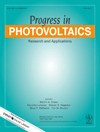
PROGRESS IN PHOTOVOLTAICS
Empowering Research in Renewable Energy TechnologiesPROGRESS IN PHOTOVOLTAICS, published by Wiley, is a leading scholarly journal dedicated to the advancement of photovoltaic technology and its applications. Since its inception in 1993, this journal has maintained a strong focus on the latest developments in solar energy, addressing both theoretical and practical aspects of photovoltaic systems. With an impressive impact factor and consistently ranked in the Q1 quartile across four key categories—Condensed Matter Physics, Electrical and Electronic Engineering, Electronic, Optical and Magnetic Materials, and Renewable Energy, Sustainability, and the Environment—PROGRESS IN PHOTOVOLTAICS is regarded as a pillar of scholarly excellence. The journal is essential for researchers, professionals, and students who seek to stay at the forefront of innovations and sustainability in the energy sector. Although it does not primarily offer open access, its commitment to advancing the understanding of photovoltaic technologies ensures that readers can expect high-quality, peer-reviewed research that pushes the boundaries of current knowledge.
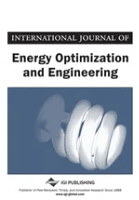
International Journal of Energy Optimization and Engineering
Navigating the Future of Energy OptimizationThe International Journal of Energy Optimization and Engineering, published by IGI Global, is a leading platform dedicated to advancing the field of energy management and optimization. With its ISSN 2160-9500 and E-ISSN 2160-9543, this journal serves as an essential resource for researchers, professionals, and students interested in innovative strategies for energy efficiency and sustainability. Although it does not currently offer Open Access options, the journal is committed to high-quality peer-reviewed content that aims to address the pressing challenges of energy consumption, renewable resources, and optimization techniques in engineering applications. The significance of this journal in the evolving landscape of energy technologies makes it an invaluable source for those aspiring to contribute to the development of sustainable energy practices across the globe.
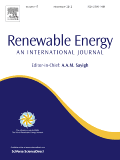
Renewable Energy
Exploring Breakthroughs in Clean Energy.Renewable Energy is a prestigious international journal published by PERGAMON-ELSEVIER SCIENCE LTD, dedicated to advancing the field of renewable energy technologies and their applications. Since its inception in 1991, this journal has provided a critical platform for researchers, professionals, and students to explore innovative solutions in renewable energy, sustainability, and environmental protection. With an impressive impact factor and ranked in the top quartile (Q1) of its category, Renewable Energy is recognized for its high-quality, peer-reviewed research that significantly contributes to the scientific and professional discourse in the sector. The journal is indexed in Scopus, holding an esteemed rank of #21 out of 270 in its field, underscoring its influence and reach. Researchers can access the journal’s articles through traditional subscriptions, ensuring a broad dissemination of vital knowledge that supports the global transition to sustainable energy sources. Addressed from its headquarters in Oxford, England, Renewable Energy is crucial for anyone involved in the journey towards a sustainable future, fostering collaboration and innovation in a critical area of environmental science.
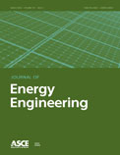
JOURNAL OF ENERGY ENGINEERING
Unveiling the Future of Energy EngineeringJOURNAL OF ENERGY ENGINEERING, published by the ASCE-Amer Soc Civil Engineers, serves as a pivotal resource in the fields of civil and structural engineering, energy engineering, and nuclear energy research. With an ISSN of 0733-9402 and an E-ISSN of 1943-7897, this esteemed journal demonstrates a consistent commitment to advancing knowledge in energy systems, sustainability, and waste management. Ranking within the second quartile in several categories—including Civil and Structural Engineering and Energy Engineering and Power Technology—this journal maintains a strong reputation, underscored by its Scopus rankings that place it in the top tiers of its discipline. Accessible from 1982 through 2024, the journal provides researchers and professionals meaningful insights through rigorously peer-reviewed articles, critical reviews, and case studies that address contemporary challenges in energy utilization and infrastructure development. Without open access options, it ensures the integrity and credibility of published work, showcasing influential research that contributes to sustainable solutions in energy and environmental frameworks. Researchers, professionals, and students alike will find the JOURNAL OF ENERGY ENGINEERING an indispensable platform for exploration and dissemination of innovative ideas within the realm of energy and engineering.
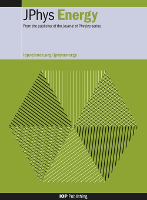
Journal of Physics-Energy
Empowering Knowledge Exchange in Energy SciencesJournal of Physics-Energy, published by IOP Publishing Ltd, is a leading Open Access journal that serves as a dynamic platform for the dissemination of high-quality research within the interdisciplinary realms of energy, materials science, and materials chemistry. Since its inception in 2019, the journal has gained remarkable recognition, achieving a prestigious Q1 ranking in multiple categories in 2023, highlighting its impact within these rapidly evolving fields. With its Scopus Ranks, placing it in the top 10% of journals for General Energy and within the top 20% for Materials Science disciplines, it reflects the commitment to excellence in research and innovation. Conveniently based in the United Kingdom, the journal is designed to facilitate collaboration and knowledge exchange among researchers, professionals, and students dedicated to advancing the understanding of energy technologies and materials science. The open access model ensures that cutting-edge research is freely available, promoting global accessibility and engagement with the latest scientific advancements.

Advances in Energy Research
Connecting Ideas and Innovations in Energy Sustainability.Advances in Energy Research is a prominent journal dedicated to the exploration and advancement of energy technologies and sustainable practices. Published by TECHNO-PRESS, this journal serves as a vital platform for researchers, professionals, and students in the energy field, featuring innovative studies and reviews that contribute to the body of knowledge surrounding energy efficiency, renewable resources, and the integration of new technologies. The journal holds a significant position in energy research and aims to facilitate the dissemination of groundbreaking findings and ideas that are pivotal for the transition toward a more sustainable energy future. Located in South Korea, with an ISSN of 2287-6316, it embraces an open access philosophy that ensures widespread availability of its content, further enhancing its impact in the academic community.